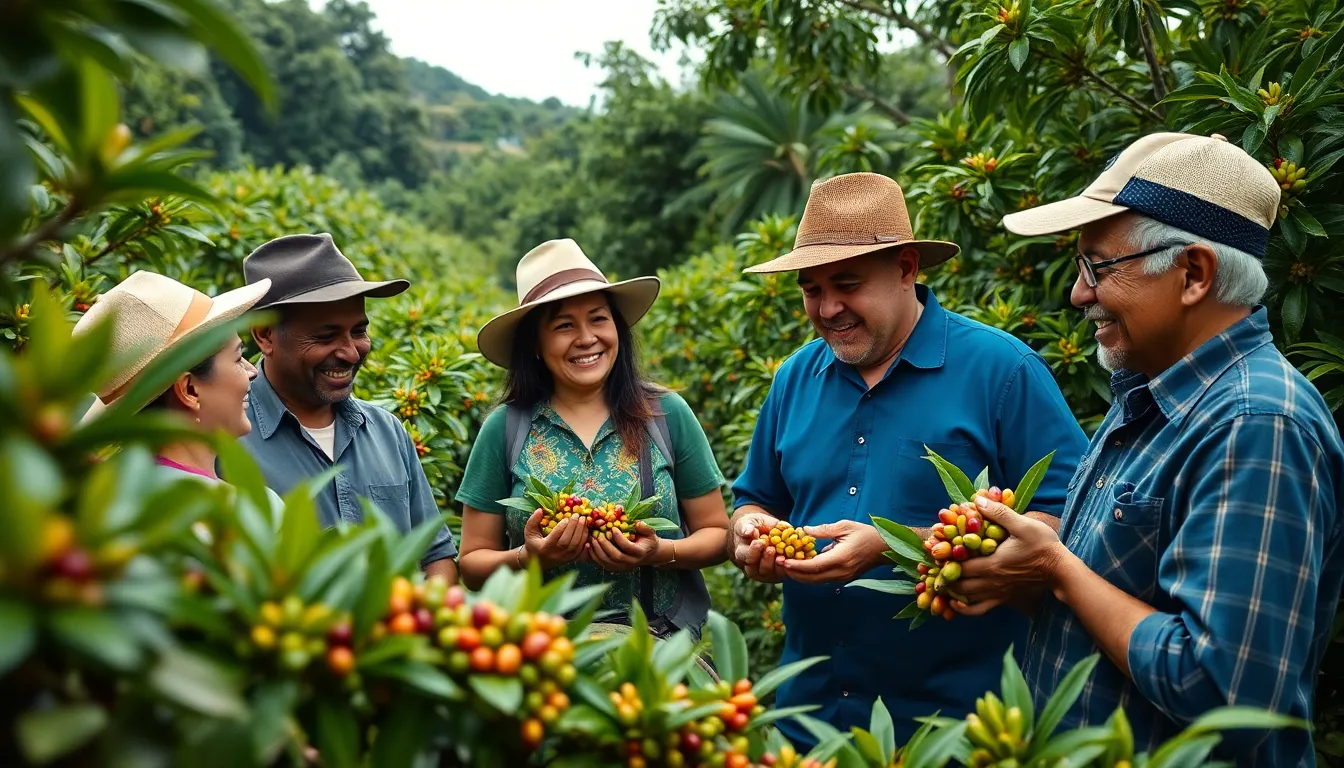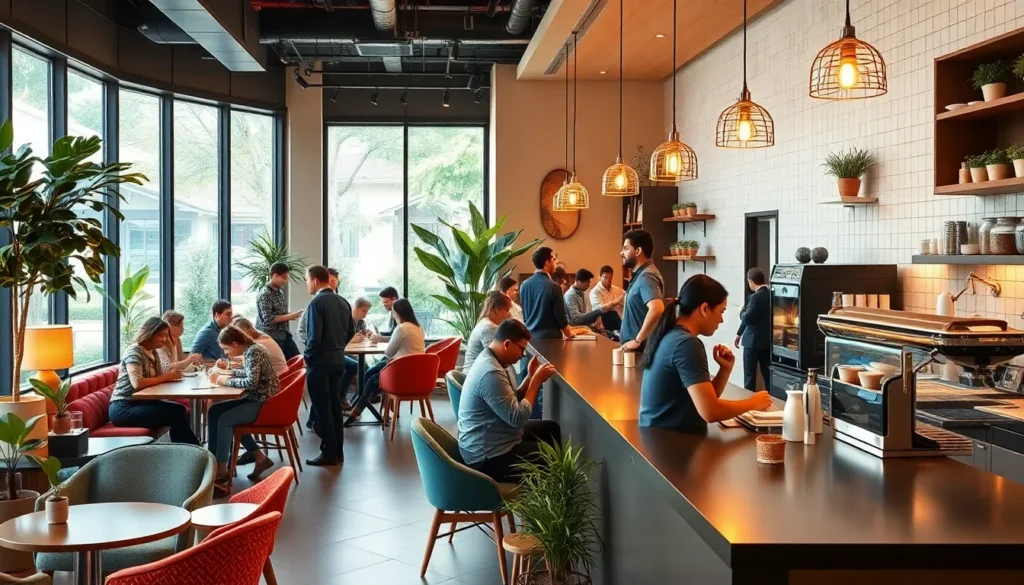In a world increasingly focused on ethical consumption, fair trade coffee stands out as a beacon of hope for both producers and consumers. This movement prioritizes social justice, environmental sustainability, and economic equity, ensuring that coffee farmers receive fair compensation for their hard work. By choosing fair trade coffee, consumers aren’t just savoring their favorite brew; they’re also supporting communities and fostering positive change.
The rich flavors of fair trade coffee come with a story that resonates beyond the cup. It connects consumers to the lives of farmers in developing countries who strive for better living conditions and sustainable practices. As the demand for ethically sourced products grows, fair trade coffee continues to gain traction, making it a vital choice for those who care about the impact of their purchases.
Table of Contents
ToggleOverview Of Fair Trade Coffee
Fair trade coffee represents a commitment to ethical consumption, emphasizing social justice and economic fairness. This movement ensures coffee farmers receive adequate compensation for their labor, typically exceeding the market price by 25% or more. Fair trade certification requires adherence to strict environmental standards, promoting sustainable farming practices and reducing pesticide use.
Farmers involved in fair trade cooperatives gain access to resources that enhance their livelihoods. These cooperatives often provide educational opportunities, healthcare, and investment in community infrastructure. As a result, fair trade coffee supports not only individual farmers but also entire communities.
The growing consumer demand for fair trade products directly impacts global markets. An estimated 1.6 million farmers worldwide are involved in fair trade coffee production, contributing to the economy of their respective countries. By choosing fair trade coffee, consumers help foster economic equity and environmental sustainability in developing nations, ensuring a brighter future for farmers and their families.
Benefits Of Fair Trade Coffee

Fair trade coffee offers numerous advantages that extend beyond the cup, impacting economic, social, and environmental aspects of coffee production.
Economic Impact
Fair trade coffee significantly boosts farmers’ incomes, typically providing compensation that exceeds conventional market prices by at least 25%. This financial stability allows farmers to invest in their farms and communities, leading to improved quality of life. Cooperatives help negotiate better prices and provide access to international markets, reducing the power disparity between large corporations and small producers. Investment in local infrastructure also contributes to regional economic development, creating jobs and fostering sustainable growth.
Social Impact
Fair trade coffee promotes social equity by ensuring farmers receive fair wages. It empowers women by enabling them to participate in cooperatives and supporting gender equality initiatives. Access to education and healthcare benefits community members, resulting in better overall well-being. Stronger community ties emerge as farmers work collaboratively, sharing knowledge and resources, which enhances their bargaining power and resilience against market fluctuations.
Environmental Benefits
Fair trade coffee emphasizes sustainable farming practices, protecting the environment. Certification requires adherence to strict ecological standards that promote biodiversity, soil health, and water conservation. Farmers are encouraged to use organic methods, reducing pesticide and chemical use. These practices not only safeguard ecosystems but also produce higher quality coffee. Moreover, fair trade initiatives often include reforestation projects, which restore habitats and combat climate change.
How Fair Trade Coffee Works
Fair trade coffee operates through systematic processes aimed at ensuring ethical practices in coffee production. The model focuses on creating equitable trade relationships between farmers and consumers while prioritizing sustainability.
Certification Process
The certification process for fair trade coffee involves several key steps. First, farmers or cooperatives apply for certification through recognized organizations like Fair Trade International or Fair Trade USA. After application, an assessment verifies compliance with fair trade standards. This process includes inspections of farming practices, record-keeping, and payment methods. Once certification is granted, farmers gain access to the fair trade market, which guarantees a minimum price often exceeding the conventional market price by at least 25%. Additionally, premium payments enable farmers to invest in their communities and sustainable practices.
Fair Trade Standards
Fair trade standards encompass environmental, social, and economic criteria aimed at promoting sustainability and equity. Environmental standards focus on sustainable agriculture techniques, minimizing pesticide use, and protecting local ecosystems. Social standards ensure fair wages, safe working conditions, and the empowerment of marginalized groups, particularly women. Economic standards promote strong cooperative structures, allowing farmers to collectively negotiate prices and access international markets. These standards collectively foster improved livelihoods for farmers while encouraging a commitment to responsible production and consumption.
Popular Fair Trade Coffee Brands
Fair trade coffee has gained popularity, with several brands committed to ethical sourcing and sustainability. Listed below are notable brands that prioritize fair trade practices:
- Equal Exchange: Focuses on small farmer cooperatives, providing higher incomes while ensuring quality products. They offer a variety of coffee blends, including whole bean and ground options.
- Stumptown Coffee Roasters: Known for its direct trade approach, this brand prioritizes relationships with farmers, ensuring fair prices and sustainable practices. Their commitment to quality results in exceptional coffee.
- Kopali Organics: Offers an extensive range of organic fair trade coffees, carefully sourced to support both farmer income and environmental sustainability. They emphasize biodiversity and eco-friendly farming methods.
- Allegro Coffee: Part of Whole Foods Market, Allegro commits to ethically sourced coffee that supports farmers and their communities. They provide a wide selection of blends and single origins.
- Peet’s Coffee: This brand features a fair trade selection that underscores its commitment to social responsibility. Peet’s partners with cooperatives, ensuring farmers receive fair compensation.
- Café Tasse: Offers fair trade coffee and a commitment to quality and sustainability. This brand supports local farmers, creating long-term partnerships that enhance livelihoods.
These brands exemplify the core values of the fair trade movement, delivering quality coffee while fostering economic equity and environmental sustainability.
Fair trade coffee represents more than just a beverage; it embodies a commitment to ethical consumption and social responsibility. By choosing fair trade options, consumers play a vital role in supporting farmers and their communities while promoting sustainable practices. The positive impacts of fair trade extend across economic, social, and environmental dimensions, ensuring that coffee production aligns with values of equity and sustainability.
As the demand for ethically sourced products grows, the fair trade movement continues to gain momentum, inspiring change in the coffee industry. With numerous brands dedicated to these principles, every cup of fair trade coffee contributes to a more just and sustainable future for farmers around the world. Embracing fair trade coffee is not just a choice; it’s a step toward meaningful global change.









